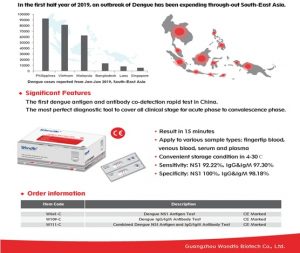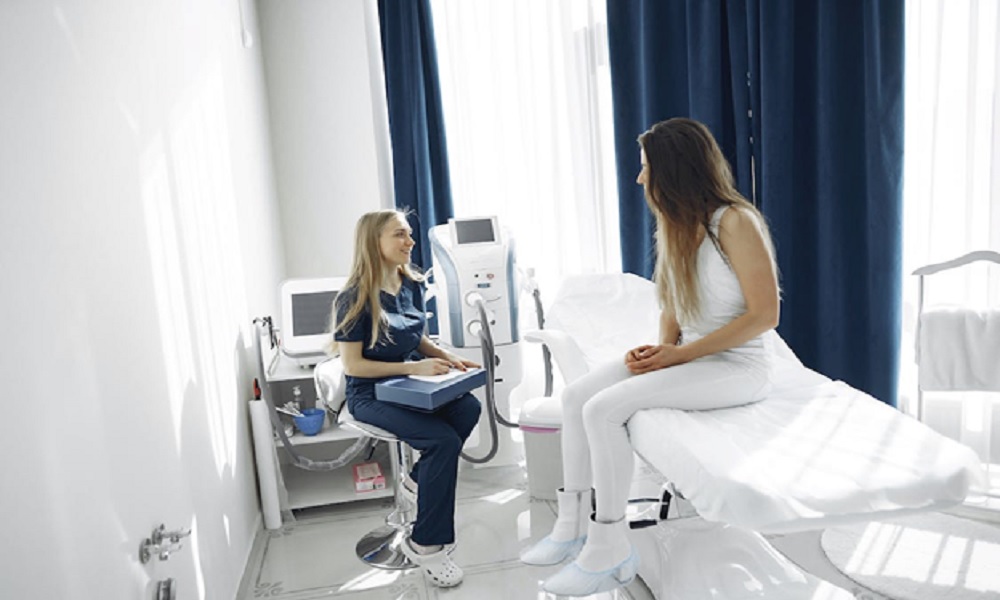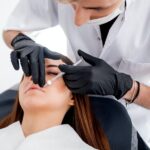What is the Dengue NS1 antigen test
Dengue NS1 (nonstructural protein 1) antigen test, is a test for dengue which allows early detection on the first few days of fever before antibodies appear in 5 or more days later. Having been used in more than 40 nations, it is now an essential criterion in Dengue diagnosis.
How does the Dengue NS1 antigen test works
The Dengue NS1 antigen test uses the qualitative detection of dengue virus in whole blood, serum, or plasma to facilitate the diagnosis of early dengue infections. Among NS proteins, NS1 is a highly conserved glycoprotein which is essential in the virus replication. The NS1 protein is associated with intracellular organelles during the acute phase of DENV infection. It can be transported via the cell secretion pathway to the surface of the infected cell.
The NS1 protein has also been released from infected mammalian cells and can then be found circulating in patient sera. It is found with endothelium, free or soluble in patients’ serum, and can be detected on days 0 to 9 after the onset of symptoms.
The characteristics of the dengue feverDengue fever is an acute disease caused by infection with one or more dengue virus (DENV 1 to 4). The viruses are transmitted by female Aedes aegypti mosquitoes and, less commonly, Aedes albopictus. It is a dynamic, broad-spectrum, systemic disease that includes both serious and non-serious clinical manifestations. Although the disease disappears on its own, for a minority of patients, dengue fever can lead to possible complications.

Why do we need the rapid dengue definitive tests
The final dengue testing includes rapid point-of-care testing, allows for rapid identification and fast notification. They are particularly useful for managing the clinical uncertainties that are often encountered in primary care. Diagnosis will also help educate patients and encourage compliance with follow-up controls. Once diagnosed, doctors can also better advise patients on appropriate measures, including measures to prevent vector bites and thus limit the spread of the disease.
Traditional ways like RT-PCR, are not suitable as a routine diagnostic process for its time consumption, low sensitivity, and laborious procedure. More importantly, the requirement of a highly trained staff, the need for sophisticated equipment as well as the cost factor has limited its application in many places.
When do we use the dengue NS1 antigen test
In general, direct virus detection methods are used to obtain early, definitive, and specific identification of the serotype. Viral detection diagnostic methods such as the NS1 antigen test, is generally used within the first week of illness onset. Dengue serology testing, on the contrary, is the most appropriate after that period. Locally available rapid point-of-care tests, including both examinations in one convenient test kit, can enhance dengue diagnosis in an endemic setting.
The availability of commercial dengue NS1 antigen test kits has provided an additional laboratory diagnostic tool for the early detection of DENV. These tests can be used in laboratories with limited resources, devoid of viral culture, or RT-PCR facilities. For example, Wondfo NS1 Antigen Test offers several advantages over current routine assays (ELISA and RT-PCR), such as rapidity, simplicity, high sensitivity(96.6%) with a shorter detection time (15min) for primary infection, and excellent specificity (100%). More importantly, patients can be promptly diagnosed as positive and advised to seek treatment in hospitals because of their high positive predictive value.
Accurate and timely diagnosis of the dengue virus is essential for early detection of dengue virus infection. In consideration of the high mortality and morbidity associated with dengue fever, particularly in tropical countries, it is imperative to diagnose the disease at an early stage. In this way, we can provide information for proper management and avoid complications.











